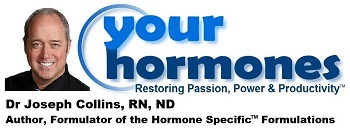
Thyroid Health Questions
How to lower anti-thyroid antibodies in patients that have Hashimoto’s hypothyroidism.
Question: I have heard you say that there was a study that showed Wobenzym® lowered anti-thyroid-antibodies, and that patients treated with Wobenzym® were able to lower their thyroid medication, and some patients were actually able to stop taking thyroid medication. Can you tell me more about that study?
Answer: The study was presented at the “International Congress on Immunorehabilitation Allergy, Immunology, and Global Net“, which was held April 21-24, 2002 at Cannes, France.
Here is the translated abstract (it was originally written in Czech and Russian):
Wobenzym in the complex treatment of autoimmune thyroiditis
Kvantchakhadze R.G. Research and Therapeutic Center of Rheumatology, Tbilisi, Gruzia VIII. International Congress on Immunorehabilitation „Allergy, Immunology, and Global Net“, April 21-24, 2002, Cannes, France International Journal on Immunorehabilitation, 2002, Vol. 4, No. 1, pp. 114. Czech abstract, Russian abstract
40 patients suffering from autoimmune thyroiditis were observed for 6 months. Patients were divided into two groups. 20 patients in the group I were treated depending on thyroid condition (euthyreosis, hypothyreosis) with L-tyroxin (25 – 100 mg daily) in combination with Wobenzym (5 coated tablets three times a day). Patients in the group II were treated with L-tyroxin only at the above dosage. Both groups were comparable with regard to age, sex, and clinical-laboratory parameters. All usual parameters were examined before treatment, after 1 and 3 months, and at the end of treatment. Improvement of thyroid parameters at ultrasound examination (reduction of size, improved tissue structure) and aspiration biopsy parameters (reduced number of lymphoid and plasmocytoma cells in cytologic punctuate) as well as significant decrease of blood thyreotropin level and titers of antibodies against thyreoglobulin and microsomal fraction accompanied by the improvement of subjective parameters were found in the group I after 3 months of treatment, whereas in the group II after 6 months of treatment. In both groups of patients suffering from hypothyreosis, an impaired lipid metabolism was found. Treatment of patients in the group I resulted in a decrease of cholesterol and triglyceride levels, whereas in patients in the group II there were no significant changes found during the treatment. In patients in the group I dosage of L-tyroxin could be lowered after 3 months of treatment, in some cases it could even be discontinued. Under continuous Wobenzym treatment improved clinical-laboratory parameters were maintained. Thus, Wobenzym was shown to be therapeutically effective in a complex therapy of autoimmune thyroiditis.
Dr Collins’ Comment:
You will notice that 40 patients were divided into two group of 20 each.
Group 1 were treated with the appropriate dosage of l-thyroxin (spelled l-tyroxine in abstract), as well as 5 Wobenzym, three times a day.
Group 2 were treated with the appropriate dosage of l-thyroxin only.
Group 1 benefited by:
- Decrease of blood thyreotropin (TSH) level and titers of antibodies against thyreoglobulin and microsomal fraction (antiTG & anti-TPO).
- Improvement of subjective parameters (symptoms).
- Decrease of cholesterol and triglyceride levels.
- Dosage of L-tyroxin could be lowered after 3 months of treatment, in some cases it could even be discontinued.
The conclusion was:
“Wobenzym was shown to be therapeutically effective in a complex therapy (used with other therapy) of autoimmune thyroiditis.”
My recommendations for Hashimoto’s thyroid disease (autoimmune thyroiditis) is:
- ThyroMend™, as directed on bottle.
- Wobenzym – as directed on bottle.
- Avoid gluten
My compilation of the international literature on Wobenzym® formulations as systemic enzyme therapy, including the Webinars, Educational posters, and an educational website, is currently being updated and edited.
Taking ThyroMend™ with thyroid medication.
Question: I am currently taking levothyroxine ( or L-thyroxine, which has many Trade Names), and would like to know if I can take ThyroMend™ with the levothyroxine. I am considering stopping the levothyroxine because it feels like my body does not like it. It is not helping me feel better.
Answer: First, I would suggest that you do not lower your thyroid medication dosage unless your physician advises you to do so.
Second, the short answer is: Yes, you can take ThyroMend™ with levothyroxine.
I have found that many patients on thyroid medication do not get the expected benefits. They often still feel symptoms of low thyroid function.
In my experience, when levothyroxine does not work properly, it is because some of the requirements for healthy thyroid function are not taking place. This could be any of the last four steps of healthy thyroid function (the first three steps involve making T4 – but since you take T4, that’s not the problem). The seven steps are described in my Educational Module: Thyroid Support
The last four steps are:
4. It could be because the T4 (levothyroxine) is not getting converted into the more active T3.
5. It could be that the cells in your body are not receiving the thyroid hormone, because their receptors are not working. This is called “receptor resistance”.
6. It could be that the thyroid hormone is not getting to the DNA in the cells of your body – so the cells of your body don’t know that they are supposed to do what the thyroid wants them to do. This is because the two proteins that help carry the thyroid hormone to the DNA have not coupled, or paired together - so they don’t get the signal to the DNA.
7. The specific genes in the DNA of cells are not able to be activated – they do not “express themselves” the way they are supposed to.
The seven requirements for healthy thyroid function are all supported and repaired by ThyroMend™, because the nine herbs work together synergistically to accomplish those goals. Learn more about the Specific Actions & Synergy. of ThyroMend™ Herbs
You can also study the Complete Thyroid Health Webinar.
Order ThyroMend™
Be in good health,
Dr Joseph J Collins, RN, ND
